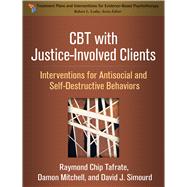Grounded in science and clinical experience, this treatment planner provides essential tools for conducting cognitive-behavioral therapy (CBT) with justice-involved clients in a wide range of settings. Guidelines are presented for assessment, case formulation, and intervention to alter criminogenic thinking and destructive lifestyle patterns. With a focus on reducing recidivism, the book demonstrates ways to enhance clients' motivation for change and elicit prosocial values and life priorities. Practitioner-friendly features include case examples, recommended assessment instruments, over 35 sample scripts, and 27 reproducible forms and worksheets; the large-size format facilitates photocopying. Purchasers get access to a Web page where they can download and print the reproducible materials.
Winner--Significant Contribution Award, Criminal Justice Psychology Section of the Canadian Psychological Association
Winner--Significant Contribution Award, Criminal Justice Psychology Section of the Canadian Psychological Association








